|
|
|
Sort Order |
|
|
|
Items / Page
|
|
|
|
|
|
|
| Srl | Item |
| 1 |
ID:
094032
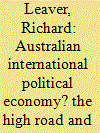

|
|
|
|
|
| Publication |
2010.
|
| Summary/Abstract |
Drawing on Karl Polanyi's distinction between formal and substantive theory, this article argues that 'an Australian international political economy' could (and should) be erected on the historical study of Australia's substantive articulations with the global economy.
|
|
|
|
|
|
|
|
|
|
|
|
|
|
|
|
| 2 |
ID:
094023
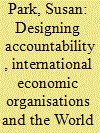

|
|
|
|
|
| Publication |
2010.
|
| Summary/Abstract |
Over the last two decades, demands for greater international economic organisation (IEO) accountability have been both prominent and vitriolic. This article demonstrates how an influential IEO, the World Bank, took up concerns of its lack of accountability through creating the Inspection Panel in 1993, in response to civil society pressures and member state demands. Drawing loosely on John Campbell's argument that ideas operating in the 'foreground' and 'background' influence policy decisions, it traces how the idea of external accountability gained strength, leading to the Inspection Panel's emergence. This contrasts with competing rational design explanations that derive 16 conjectures to explain why states design the institutions they do. The article proceeds in four parts: first, the basis for examining IEO and World Bank accountability is outlined, before detailing how a rational design argument would apply to the establishment of the Inspection Panel. A constructivist account of how ideas of accountability emerged and shaped the policy formation process is then provided, which establishes a comprehensive explanation of how and why the Inspection Panel was created the way it was and not otherwise. The conclusion then reflects on the importance of the formation of external accountability mechanisms for IEOs and of ideas in shaping international institutions.
|
|
|
|
|
|
|
|
|
|
|
|
|
|
|
|
| 3 |
ID:
094021
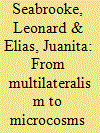

|
|
|
|
|
| Publication |
2010.
|
| Summary/Abstract |
In recent years there has been a great deal of discussion about traditions in international political economy (IPE) scholarship.1 A number of essays and books have been produced that ponder how American IPE scholarship differs from British IPE scholarship, kicked off by Jerry Cohen's (2008a) intellectual history of the field. Journals such as the Review of International Political Economy and New Political Economy have spent significant amounts of time debating these issues. Conference panels have been formed, workshops organised, and essays prizes announced. Understandably, Australian IPE scholars have been keen to put forward their views on how Australian and Australia-based scholars fit within these traditions or schools of thought.
|
|
|
|
|
|
|
|
|
|
|
|
|
|
|
|
| 4 |
ID:
094029
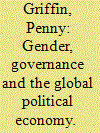

|
|
|
|
|
| Publication |
2010.
|
| Summary/Abstract |
This article considers a range of governance actors (including also the role of political enquiry into the global political economy in and of itself) to analyse how neo-liberal governance strategies seek to socialise human bodies (female, male or otherwise) into a global system of neo-liberal economic productivity. Contemporary mechanisms of global governance, it is suggested, seek to engineer a capitalist 'market society' while claiming to 'empower' poor people. In recent years, 'empowerment' rhetoric in global governance has increasingly depended on measuring the 'economic' role(s) of women in developing countries, judging their contributions productive only where they can be gauged to directly contribute to 'formal economy' growth. Reinforcing the assumption that 'formal' contributions are the only contributions worth measuring, such rhetoric simultaneously eradicates all other (non-competitive and/or non-entrepreneurial) behavioural possibilities for women, while clearly excluding all those who are not 'women'. Against the instrumentalisation of gender (as a category pertaining only to women and studies of women), this article argues that gender in global governance means much more than simply describing whether people are male or female and quantifying their productive capacities accordingly. As a broad and complex category of analysis, gender enriches the dynamism both of our studies of and practices in the global political economy. To ignore gender's role in the global political economy is to fail to see the power that gender (as a composite part of the relations of power that drive systems of economic development and growth) brings to our everyday understandings, and especially to our understandings of economic 'common sense'.
|
|
|
|
|
|
|
|
|
|
|
|
|
|
|
|
| 5 |
ID:
094028
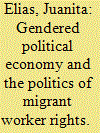

|
|
|
|
|
| Publication |
2010.
|
| Summary/Abstract |
Focusing on the South-East Asian region and looking specifically at activism around the position of migrant domestic workers in the region, this article seeks to evaluate why migrant activist organisations appear to have had, at best, modest influence on gendering the International Labour Organization's approach to labour rights. The author argues that this is largely due to how dominant understandings of labour rights have neglected the significance of social relations of reproduction (i.e. those 'care-related' activities associated with the household) to the functioning of the labour market. Furthermore, a transnationalisation of social relations of reproduction is manifested in the increased feminisation of labour migration in the region and this highlights further problems with dominant labour rights perspectives that remain largely state-centric in their approach. The significance of South-East Asian states in promoting localised regimes of citizenship/immigration and industrial relations greatly limits the ability of activist groups to claim and utilise the language of human rights. Nonetheless, the article argues that a concern with the human rights of female migrants can potentially destabilise dominant understandings of labour and human rights. More generally, the article seeks to demonstrate the insights that a critical feminist human rights approach can bring to studies of work and employment within international political economy.
|
|
|
|
|
|
|
|
|
|
|
|
|
|
|
|
| 6 |
ID:
094026


|
|
|
|
|
| Publication |
2010.
|
| Summary/Abstract |
Why is it that the World Bank has failed to effectively incorporate the impact of regionalisation within its economic development strategies and policy advice for borrowing countries? This is an interesting puzzle given the increasing importance that scholarly observers, policy practitioners and development agencies have attached to regionalism and regionalisation in recent years. In the fiscal years 1995-2005, the World Bank provided only US$1.7 billion in support for regional (or multi-country) operations across the globe-this is less than 1 percent of its project and other funding overall. In South-East Asia, while the Asian Development Bank has had a particularly strong engagement with regionalism, the World Bank has only recently started to come on board with regional analysis and programs. The article proposes that the gap is due to a combination of institutional and ideological factors, and explores this proposition through a study of the World Bank in Vietnam.
|
|
|
|
|
|
|
|
|
|
|
|
|
|
|
|
| 7 |
ID:
094024


|
|
|
|
|
| Publication |
2010.
|
| Summary/Abstract |
The International Monetary Fund (IMF) has become one of the most controversial international institutions in history. The IMF's crisis management responsibilities expanded via its involvement with a series of international economic crises during the last three decades, which led to widespread calls for radical reform of the organisation in the aftermath of the emerging market crises of the 1990s. This article examines the IMF's initial response to managing the effects of the global credit crunch, focusing on the new round of large IMF loans approved in late 2008 and early 2009, to assess how much IMF lending policies have changed in practice compared with earlier international crisis episodes. While the organisation has continued to promote conventional loan policy targets aimed at achieving low inflation, low budget deficits, and sustainable public debt, the preliminary evidence also suggests the IMF is developing a more flexible approach to crisis management in borrowing member states. Changes include a greater tolerance for unorthodox policies such as short-term capital controls, greater differentiation in the treatment of borrowers based on their economic circumstances, easier access to precautionary IMF financing for prime borrowers, and more flexibility in the use of loan conditionality.
|
|
|
|
|
|
|
|
|
|
|
|
|
|
|
|
| 8 |
ID:
094031


|
|
|
|
|
| Publication |
2010.
|
| Summary/Abstract |
This article offers a political analysis of development and poverty reduction initiatives from a social-relational perspective. More specifically, the author draws on the example of microfinance schemes to illustrate the way in which poverty reduction policy is increasingly advanced in response to social resistance to experiences of destitution, which is itself produced through development. The perspective the author advances disrupts conventional framings of development and poverty in terms of independent domains abstracted from social relations of power and resistances. Furthermore, it brings into view the global dimension of these social relations, articulated and co-constituted through a range of actors across different levels of governance. Through the social-relational lens, the development paradox is also revealed: development processes have produced destitution which, in turn, becomes the target of poverty reduction ('development') initiatives, which are themselves yet again premised upon either realising economic growth or maintaining, at a fundamental level, social relations of inequality and dispossession. This paradox is neither explicable nor discernable from orthodox conceptions of the international political economy of development.
|
|
|
|
|
|
|
|
|
|
|
|
|
|
|
|
|
|
|
|
|